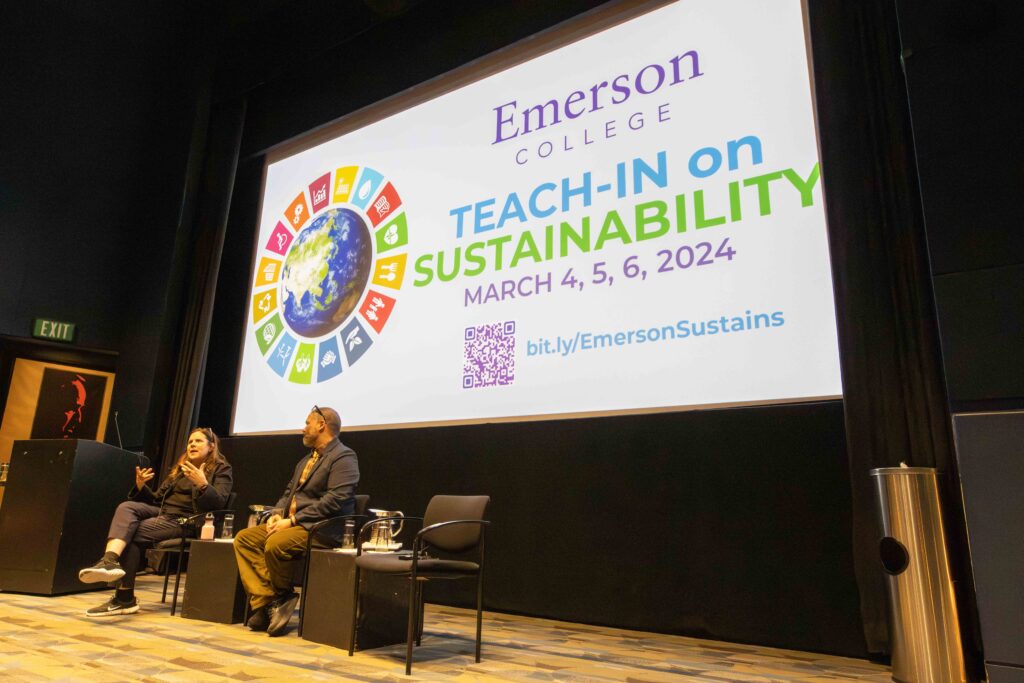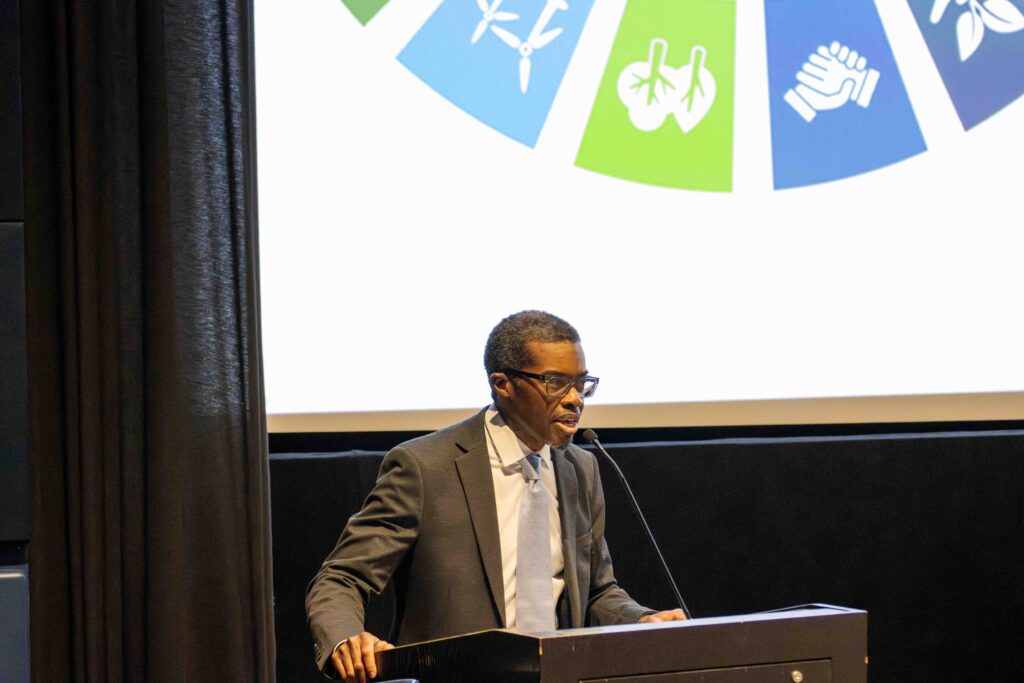Teach-In Keynote Speaker Stresses Sustainability from Script Through Production

Emmy Award-winning, Academy Award-nominated filmmaker Lydia Dean Pilcher kicked off Emerson’s Teach-In on Sustainability by talking about her personal evolution towards becoming a Hollywood climate leader and educator.
“Around 2006, I became concerned about global warming. As a young mother it connected me to the reality that as humans, we’re part of the natural world,” said Pilcher from the Bright Family Screening Room on Monday. “We’re not here to dominate or control it…I saw Al Gore’s documentary [An Inconvenient Truth]. It was a wakeup call. It changed my worldview.”
When introducing Pilcher, Emerson President Jay Bernhardt wanted to make one thing very clear during the keynote event for the Teach-In on Sustainability.
“Emerson College is committed to sustainability in all that we do – in our operations, in our curriculum, and in our long-term strategic planning,” said Bernhardt, who repeated the phrase two more times during his introduction speech.
Pilcher’s credits include Mississippi Masala, The Darjeeling Limited, The Talented Mr. Ripley, and more. She produced the documentary Cutie and the Boxer, which received an Academy Award nomination in 2014 for Best Documentary Feature Film, and won an Emmy for Best Documentary Feature Film in 2016.

She went on to found and chair PGA Green, an initiative of the Producers Guild of America that is dedicated to supporting sustainability in the entertainment industry. It received fund seeding and support from Disney, DreamWorks Studios, 20th Century Fox, NBC Universal, Paramount Pictures, Sony Pictures Entertainment, and Warner Bros.
The organization created the Green Production Guide, a resource for film, television, and commercial professionals to increase sustainability of their productions. It provides a recommended vendors list, a carbon footprint calculator, a best practices list, and more. There’s info on things such as solar-powered trailers and green jobs that pertain to productions.
Pilcher talked to students about working in the sustainability industry, one of the main focuses of the Teach-In.
“An eco-steward is a role that’s rapidly expanding. It has different titles like eco-supervisor,” said Pilcher. “There are companies training for these positions like the Green Spark Group and Earth Angel. They work everywhere with film crews. Depending upon the size of the production, you may have one person or a department of six. It is really essential to have a team to lean green on sets.”
Pilcher said that about 10 years ago she decided to bring her passions for storytelling and the environment together.
“From my experience as a producer, I could see firsthand that old narratives and tropes could really get stuck in Hollywood suites,” said Pilcher. She found there weren’t a lot of movies telling the story of climate change. There was the disaster film The Day After Tomorrow, and that did get people to see what a fast climate event could look like. “Lisa Simpson tried to warn us [about global warming and climate change].”
Pilcher developed environmental projects, but executives said that audiences weren’t interested. She decided to drop her budget level and go for productions costing $2 million or less, and that made it easier to be independent.

That led her to directing Radium Girls. The film is set in the 1920s, and is about a group of factory workers advocating for safer work conditions after some of them become ill from radium exposure.
“The radium company had their own doctor diagnose them with syphilis,” said Pilcher. “At this time women had recently gained the right to vote. There weren’t child labor work rights.”
The Environmental Protection Agency (EPA) still uses the Radium Girls as an example of businesses covering up science, said Pilcher. She said filmmakers can tell the story of climate change. While the plot of the Netflix hit, Don’t Look Up, is about a comet hurling towards earth, the story satirizes climate denial and underlines how oil and gas companies knew decades ago that their products could lead to devastating climate impacts, and spent billions to block legislation, she said.
Pilcher said that China, U.S., and India, contribute more than 40 percent of the total global emissions.
“We’re battling big narratives. We’re a climate supermajority and it’s time for us to control the narrative,” said Pilcher.
Pilcher referenced the 2023 Hollywood Climate Summit, which included Emerson alums Daniel Kwan ’10 and Daniel Scheinert ‘09, AKA The Daniels, creators of the Oscar-winning film Everything Everywhere All at Once. The Daniels said they looked at ways to be environmentally-minded on set and had an eco-coordinator, and uneaten food went to farms or to homeless shelters.
Pilcher said that progress is being made, citing NBC Universal’s announcement that it’s embedding sustainability from the script stage through production.
“It can be layered into building the show…the idea is to not pretend like it doesn’t exist…,” said Pilcher. “It could be a sub plot, or stories with nature and human agency. Let’s talk about storytelling and how it can play as a solution to climate story telling.”
Categories